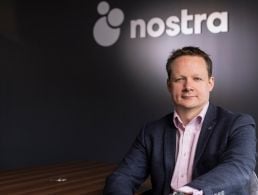Widely regarded as a visionary in the media and telecommunications industries, the chief technology officer of BT, Matt Bross (pictured), was fired up about the convergence of mobile, fixed and internet services upon a recent visit to Dublin. Convergence is one of those oft-used – and abused – words in the technology dictionary, but if Bross has his way we will witness the very first converged systems and services later this year.
From BT’s R&D headquarters at Adastral Park in the UK, Bross has played a guiding role in BT’s constant move in the direction of ICT services and ultimately, convergence, as illustrated through the company’s recent alliances with both HP and Vodafone.
Bross has been working on ways of linking existing technologies such as mobile with technologies like Bluetooth and Wi-Fi into meaningful product sets. BT’s goal is to generate around £1bn sterling of annual mobility and convergence revenue over the next five years.
In November, Bros explained, the company plans to introduce what it terms its Bluephone in Ireland and the UK. The Bluephone will be a mobile phone that when in a person’s home or office will operate as a voice-over IP (VoIP) phone using DSL connectivity of the internet through a Wi-Fi connection. When the person leaves the Wi-Fi domain the phone connects instantly onto a GPRS network, with all the billing converged.
Project Bluephone has undergone successful trials with 50 users over the past two months and the technology is proven. Now it is to be brought to market by BT in close collaboration with Alcatel, Ericsson and Motorola. A ‘soft launch’ involving more than 1,000 users is planned for this summer, with a full launch later this year. According to Bros the first Bluephone device likely to debut in Ireland could be the Motorola V320 device.
The Bluephone news has been preceded by Esat BT’s recent decision to launch the first hosted VoIP service in Ireland, which in effect could act as a precursor to the adoption of the Bluephone. The first wave of VoIP services will be targeted at SMEs, corporate and public sector customers, before being rolled out to the company’s 10,000 residential broadband customers in a few months.
At the heart of all of this, Bross expains, is convergence. “At Adastral Park we are looking at enhancing the quality of people’s lives as well as their experience of communication through the invention of new technologies as well as the maturing of some existing technologies. Our ultimate objective is to be a leader not only in inventing new technologies but through adding value to both the customers and our shareholders. What has us fired up right now is the question: ‘How do we deliver a meaningful experience?’ We see strengths in tying together technologies like existing cellular, Bluetooth, WiFi and unified billing in a subtle way. It could be described as concatenation – a subtle linking together of these technologies in a way that delivers a meaningful experience.”
According to Bross, the recent fixed to mobile alliance between BT and Vodafone in the UK is the first throw of the dice. “We are aiming to deliver true fixed-to-mobile convergence not just in the UK but in Ireland before the end of this year. A key fixture of this strategy will be the introduction of what we term Project Bluephone, with the first handsets aimed for delivery to the market in October. The Bluephones will effectively allow people to wirelessly use the same phone in the home as well as out in the street.
“Basically, when they are at home the phone connects through Bluetooth and WiFi to the fixed line network and they can make their phone calls using VoIP, but when they go outside the phone automatically roams onto the GPRS or 3G network and they can have the same experience, with one phone and one bill. When they walk into their house it costs less,” he added.
Bross believes that converged devices like the Bluephone and services like VoIP will merge seamlessly with new services like 3G and WiFi. “The way we see it, it is all about creating a seamless experience whatever device you use, wherever you use it. Technologies like Wimax (expected to be able to transmit broadband wirelessly over 30km) will help operators like BT and Vodafone to tie together various WiFi networks as well as augment 3G services into one rich media experience.”
While traditional telecommunications players like BT appear to be looking to VoIP, which will give users access to cheaper calls over the internet, there is the danger that they could be cannibalising their own market. Bross is nonplussed. “In the fourth quarter we grew our revenues 1.4pc through what we term ‘new wave’ revenues. We are investing heavily in the broadband space. We are working to be seen as an ICT business that incidentally has a network inside it, a network centric business.
“However, instead of coming up against established IT players, we believe that partnership is the best way forward, hence our recent partnership with Hewlett-Packard (HP), which evolved out of our shared experience working on the Bank of Ireland contract and the enterprise contract last year with the NHS in the UK. We took care of all the communications pieces while HP took over the outsourced management of Bank of Ireland’s desktop management. We realise that we can’t do this alone, we don’t have all the pieces of the puzzle. Therefore partnerships and alliances are crucial. We also have an alliance with Microsoft and will be looking to deploy software on an ASP (application service provider) or rented basis to SMEs, giving them the same reach as a larger institution. We recognise that we won’t go far with a go-it-alone strategy, but collaborations make more sense.”
As BT steadily moves towards a new future as a potential ICT player that incidentally owns a major telecoms network, Bross believes the entire telecoms industry is ripe for fundamental change. “Mobility and broadband are outstripping declines in the traditional telecommunications business. Voice will soon become an application on a data network as opposed to being a network like the traditional PSTN.
“While the calls market is still a big piece of our business, we recognise the opportunity to retain customers and grow through new wave revenues. We are projecting a 38pc growth of our £3bn sterling business by adding new wave products through convergence and contract wins through collaborations and partnerships. We are leaving a 100-year era to a new era where the killer app will be convergence. We are breaking from a 100-year focus on narrowband voice and lines to an era where people will always be ‘best connected’ whereby instead of accessing a network, the network will find them,” Bross concluded.
By John Kennedy




